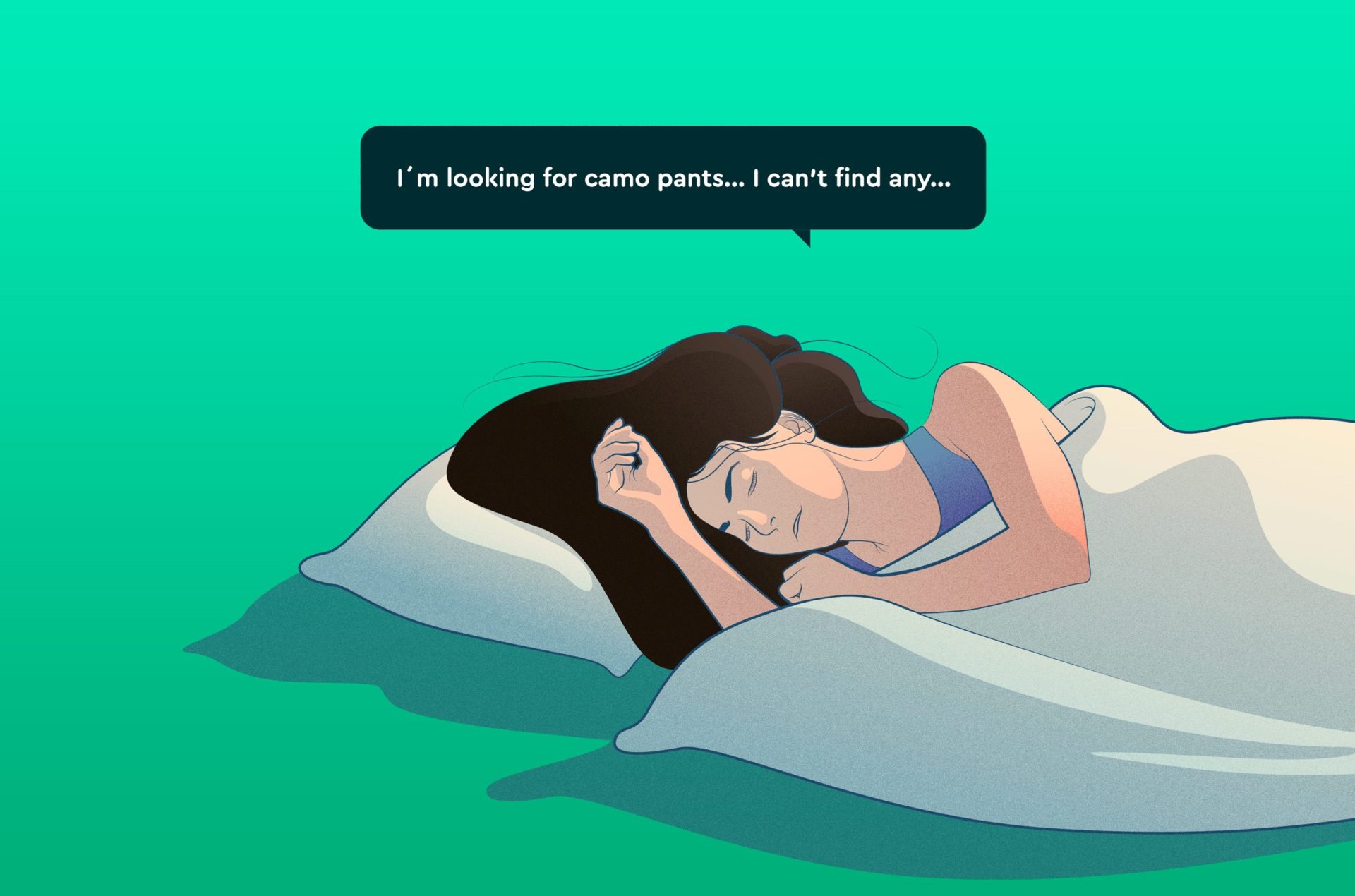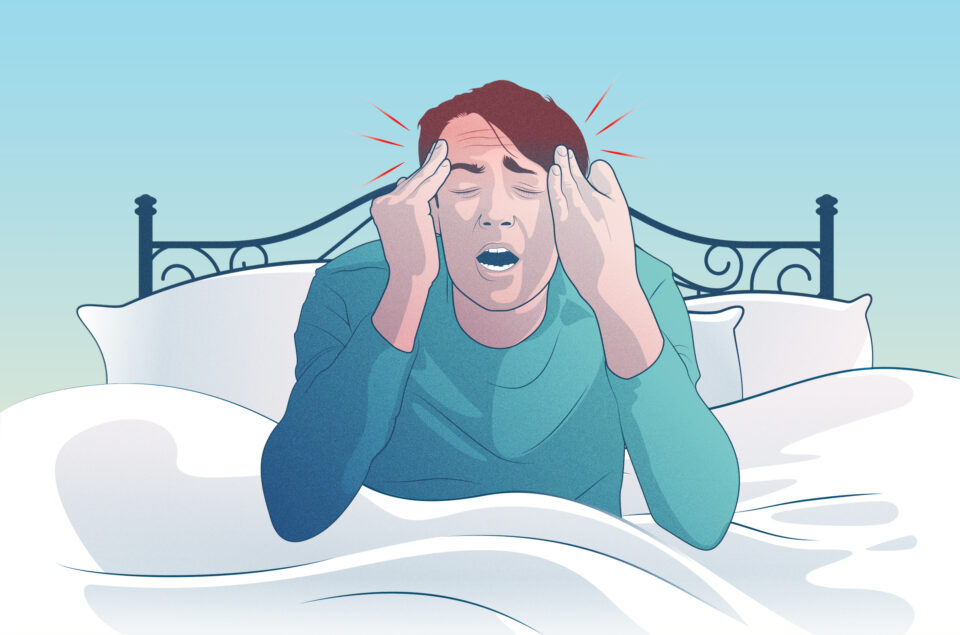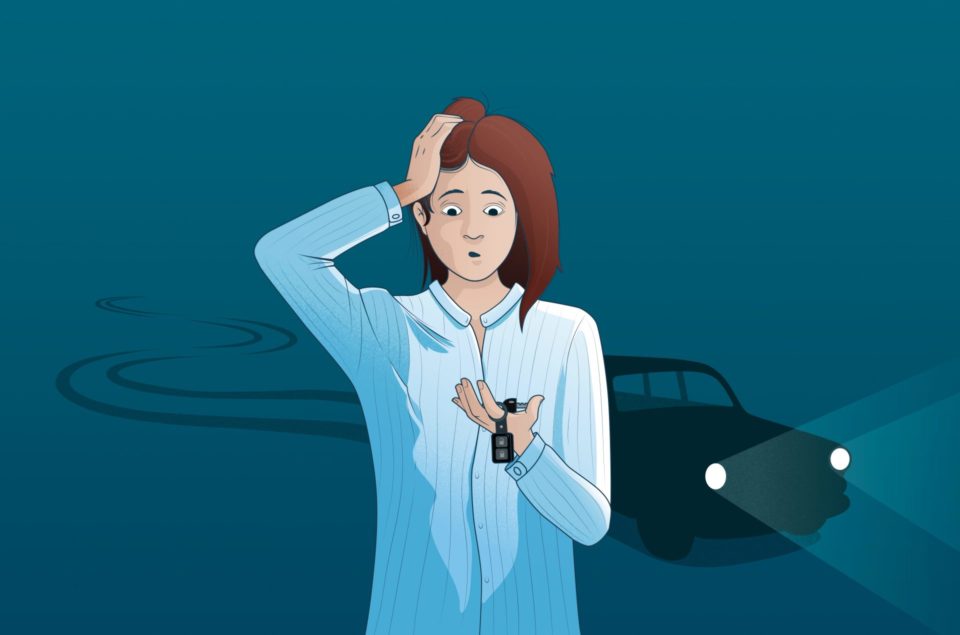Causes, Prevention, and How to Record It with Sleep Cycle
Sleep talking, or somniloquy, is a form of parasomnia or abnormal sleep behavior. Talking—or mumbling—in your sleep is not unusual or dangerous. It can occur in both REM and non-REM sleep. While there is very little in the way of clinical research on sleep talking, it remains a source of intrigue for many. Do we reveal our darkest secrets in our sleep? Do dreams impact what we say? Is sleep talking a sign of stress? Can it be cured? Here, we answer the most frequently asked questions about sleep talking.
What is sleep talking?
Sleep talking is a condition in which a person talks during their sleep without being aware. This can range from simple sounds to long speeches. Sleep talking can occur in any sleep stage, and its frequency can vary from night to night.
What stage of sleep does sleep talking occur?
Sleep talking can occur during both Non-REM (Rapid Eye Movement) and REM sleep stages, although most common during Non-REM (NREM):
- NREM Stages 1 and 2: the speech of a sleep talker in the early stages of sleep might be easy to understand and make sense.
- NREM Stages 3 and 4: the sleep talker here is in a deeper sleep, and the speech might sound like moaning and, consequently, be harder to understand. In these stages, sleep talking can be confused with catathrenia – a separate condition in which people groan in their sleep. Unlike sleep talking, catathrenia harms sleep quality and can cause fatigue.
- REM: When sleep talking occurs during this dream stage, the words spoken in a dream are often spoken out loud. Depending on the frequency, it may be a symptom of REM sleep behavior disorder, where people tend to unknowingly act out their dreams.
Who talks in their sleep?
Anyone can experience sleep talking. However, children are more likely to talk in their sleep than adults, and there’s some indication that men may sleep talk more than women.
Why do people talk in their sleep?
Sorry folks, but there’s really no good answer as to why we talk in our sleep. We know that sleep talking is prevalent and has been documented for a long time throughout history (there are papers from as early as 1892 on the subject.) However, it’s not so easy to study because its occurrence is random.
However, some research points out that genetics may contribute to sleep talking. Similarly, people who sleepwalk, experience night terrors or have REM sleep behavior disorder are more likely to be sleep talkers. Some of these parasomnias may have a common cause, even if we don’t know yet what exactly the cause is. The likelihood of experiencing sleep talking is also higher if we also tend to experience nightmares, or suffer from sleep deprivation, sleep apnea or sleepwalking.
Moreover, sleep talking can be triggered and can increase at certain times by:
- Medication
- Fever
- Alcohol
- Mental health conditions, such as depression or stress
How prevalent is sleep talking?
According to this study from Norway, there is a 66% chance that you will experience sleep talking at some point in your life. Since we generally aren’t aware of when we do it (and usually don’t remember it), it’s probably widely underreported. According to the American Academy of Sleep Medicine, the ongoing prevalence of sleep talking in adults is only around 5%.
Sleep talking is also twice as common among people with post-traumatic stress disorder or psychiatric disorders and can be frequent in certain types of dementia or in people that experience seizures during sleep.
How can you stop talking in your sleep?
Since we don’t know why we do it, we don’t really have good information on how to stop sleep talking episodes, and there is no such thing as a “cure”. If you are a sleep talker, and awakening that part of the brain which produces speech, then some good advice is to think about your sleep routines and regularity for better sleep hygiene. Research points out that most parasomnias may be triggered when sleep patterns are disturbed. Therefore, improving your sleep environment and sleep habits are key to preventing future episodes. Some tips to improve your sleep hygiene are:
- Avoid caffeine or other stimulants in the evening.
- Keep a consistent sleep schedule, especially during the weekends. Avoid naps late in the day
- Make sure that your bedroom is a sleep space free of bright lights or sounds, and with an adequate temperature (21-23 °C or 67-70 °F).
- Limit the use of electronic devices before bedtime, giving yourself time to relax and meditate
- Exercise during the day, or go for a walk to get some daylight.
Should you seek treatment for sleep talking?
Sleep talking, in itself, is typically not a cause for concern. In most situations, treatment is not necessary because of its random occurrence and minimal negative consequences. But if you suddenly start sleep talking as an adult, and especially if it leaves you feeling tired during the day or if you experience sleep or mental health problems, then it’s a good idea to seek professional help. As said, people with PTSD or mental health issues might be more prone to become sleep talkers.
Do dreams have anything to do with sleep talking?
While it’s easy to believe that what we say in our sleep has something to do with our dreams, we simply don’t know much about the relationship between dreams and parasomnias. The science can’t confirm or exclude the possibility that sleep talking is to some extent based on dreams.
The paper, “Sleep talking: A viable access to mental processes during sleep,” published in Sleep Medicine Reviews in 2019, allows that there may be an overlap of sleep talk and dream content. However, it’s still speculative. Just as it’s hard to study sleep talking, it’s not easy to get reliable measures of dream content.
An interesting citation from the paper illustrates the difficulties in establishing if sleep talk is related to dreams. “A large number of sleep speeches merely consist of short expressions of assent or negation (e.g., ‘OK’, ‘no,’ ‘good,’ ‘mm-hm,’ ‘uh-huh,’ ‘no!’ ‘stop!’ ‘don’t!’, etc.) and sound like half a conversation or an attempt to contact another person, often with pauses during which the ‘other’ replies.”
Do the words we speak in our sleep mean something?
Sleep talking episodes tend to be short and rarely involve long conversations. In fact, an episode may just involve a bunch of words and unmeaningful sentences. A study from 2017 looked at people with REM sleep behavior disorder, sleep talking, sleepwalking or sleep terrors. From the speech episodes recorded, they found that:
- 59% contained non-verbal addresses—mumbles, shouting, whispers
- “No” was the most frequent word
- Verbal abuse lasts longer in REM sleep and was mostly directed towards insulting or condemning someone
- Swearing was more prevalent in non-REM sleep
- Men sleep talk more than women during a night and use a higher proportion of swearing
- 15.5% of words belong to a foreign language!
What does it all mean? That is still much of a mystery. If anything, the study highlights the difficulty in discerning meaning from the content of what is said during a sleep talking episode.
When can sleep talking become problematic?
Even though sleep talking is generally not problematic, if talking in your sleep disturbs a roommate or a bed partner, it can be a problem. You could also feel stressed about cursing or saying something embarrassing in your sleep, which could make you feel more stressed about going to sleep. This in turn could increase the risk of sleep problems.
Are you worried about revealing deep, dark secrets that your partner will hear? Worry not. While it’s a great plot device for a TV drama, revealing secrets while sleep talking is probably unlikely to occur. According to a study, it’s not the best method to get someone to reveal their secrets!
Why shouldn’t you wake up sleep talkers?
Waking up a sleep talker is generally not harmful, but it can be startling and disorienting for them. It’s usually best to let them continue sleeping unless they are in danger of harming themselves or others.
How to understand if you are sleep-talking
Most people are unaware that they talk in their sleep. Here’s how you can find out if you do:
- Ask a partner or roommate: They might be able to tell you if they’ve heard you talking in your sleep.
- Use a Sleep App: The Sleep Cycle app has a Sound Recorder feature that can record sounds during the night, including sleep talking. This can help you monitor and understand your sleep quality.
Using the Sleep Cycle app to record and understand if you sleep talk
The Sleep Cycle app offers a Sound Recorder feature that can help you track your sleep talking. Here’s how to use it:
- Open the Sleep Cycle App: Set the alarm and place your phone close to your bed.
- Review the Recordings: In the morning, navigate to the “Journal” tab where you can check statistics and listen to the recordings to check for any instances of sleep talking.
By using the Sleep Cycle app, you can gain insights into your sleep patterns and understand how often you talk in your sleep. This can be useful for identifying any potential triggers and improving your overall sleep quality.
Try Sleep Cycle for free and check if you talk in your sleep










